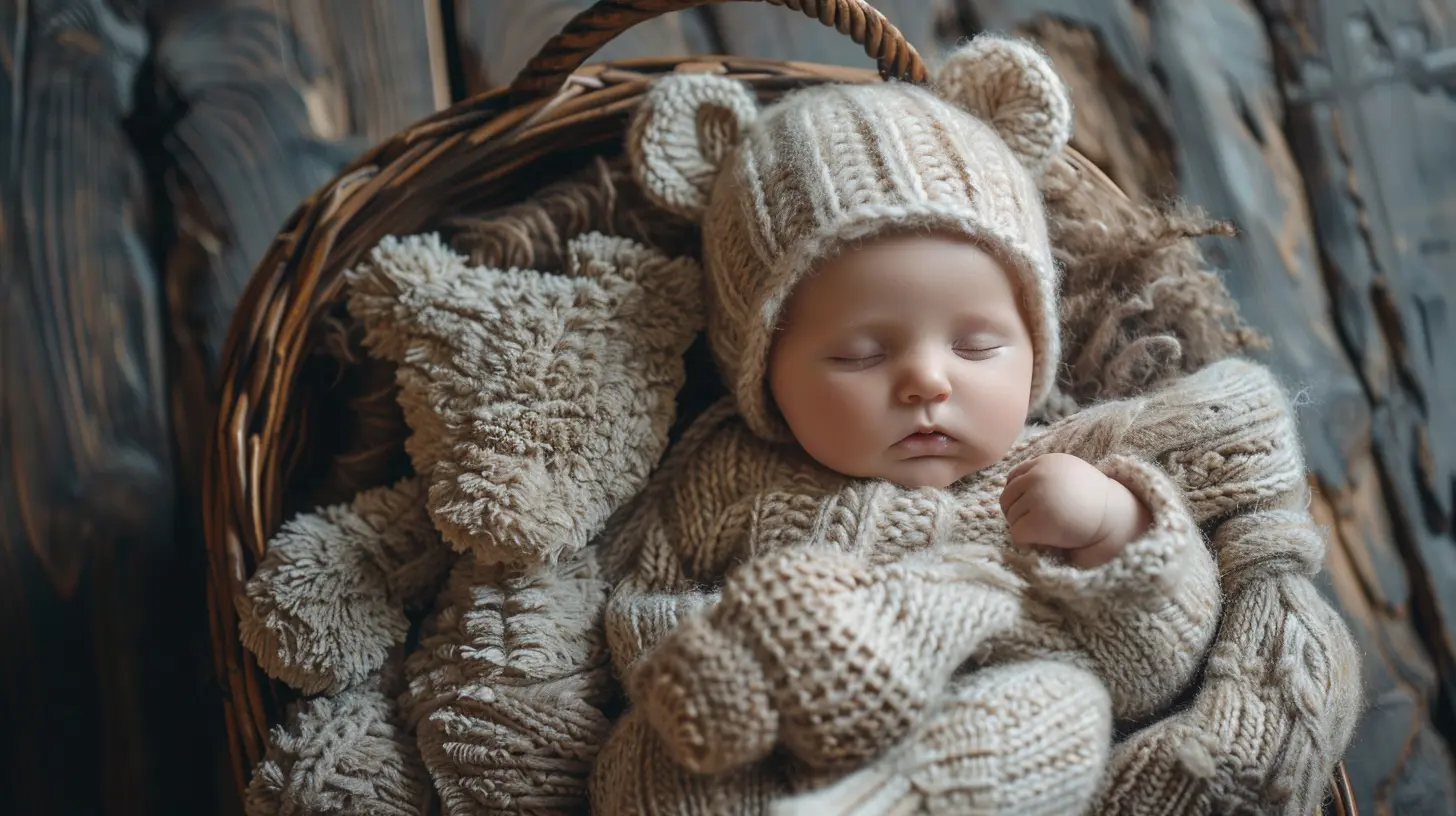Common Myths About Newborn Care Debunked
19 November 2025
Bringing home a newborn is magical, terrifying, and filled with a thousand questions. Everyone—and I mean everyone—suddenly becomes an expert on baby care. From your neighbor to your distant aunt and even that random stranger at the grocery store. With all the unsolicited advice and old wives' tales floating around, it’s no wonder new parents feel overwhelmed. So, let’s cut through the noise.
In this post, we’re tackling some of the most common myths about newborn care. The goal? To give you peace of mind and help you confidently care for your little one—with science-backed advice, not grandma's neighbor's cousin's opinion.

1. Myth: You Should Keep Newborns Inside for the First Few Weeks
Let’s start with a classic. Many parents believe they shouldn't take their newborn outside for the first month—or longer. The truth? Fresh air can be really good for your baby (and you).Sure, you’ll want to avoid crowded places or sick people, but a quiet walk in the park with your newborn, properly dressed for the weather? Totally safe. In fact, it can have calming effects on both baby and parents. Just remember: no direct sunlight for newborns, so keep them shaded and cozy.

2. Myth: Holding Your Baby Too Much Will Spoil Them
Oh boy, this one is everywhere.There’s a persistent belief that if you hold your baby whenever they cry, they’ll become too dependent or “spoiled.” But here's the thing—newborns don’t cry to manipulate. They cry because they need something: comfort, food, a diaper change, sleep, or just your presence.
Responding to your baby’s needs actually builds trust and helps them feel secure. This sense of security leads to healthier emotional development. So go ahead, snuggle away! You're not spoiling your baby—you’re nurturing them.

3. Myth: Newborns Need Complete Silence to Sleep
Raise your hand if you’ve tiptoed around the house like a ninja during nap time. 🙋The idea that babies need total silence to sleep is pretty common, but not entirely accurate. Remember, your baby spent months in the womb surrounded by constant noise—your heartbeat, your voice, and all sorts of bodily sounds.
White noise machines can actually mimic that environment and help lull your baby to sleep. So no, you don’t need to shut down the whole house during nap time. And yes, your baby can (and should) learn to sleep through everyday background noises.

4. Myth: You Must Bathe Your Baby Every Day
Daily baths can actually dry out a newborn’s delicate skin. Their skin is ultra sensitive in those early weeks, so bathing them 2-3 times a week is usually plenty.Between baths, just clean the important parts—face, neck folds, hands, and diaper area. It's called a "top and tail" wash. Think of it as a mini refresh instead of a full shower. Plus, less bathing = less screaming (hopefully).
5. Myth: Formula-Fed Babies Won’t Bond With Mom Like Breastfed Babies
Feeding time isn’t just about nutrition—it’s about connection. Yes, breastfeeding has benefits, but that doesn’t mean formula-feeding moms aren’t bonding with their baby. Bonding happens through eye contact, touch, and simply being there.Whether you're nursing or feeding with a bottle, the love and care you offer during those moments are what truly matter. So put away the guilt. You’re doing great.
6. Myth: Teething Starts at Three Months
Every time a 3-month-old drools or starts chewing on their fists, someone’s bound to say, “They must be teething!”But let’s pump the brakes. While teething can start anywhere from 3 months to well over a year, most babies don’t actually cut their first tooth until around 6 months. Drooling and chewing are normal developmental stages, and not always signs of teeth.
So don’t rush to blame every fuss on phantom teeth.
7. Myth: You Should Wake a Sleeping Baby to Feed at Night
This one depends—are we talking about a healthy, full-term newborn? If so, once your pediatrician gives the green light and your baby is gaining weight steadily, you can let them sleep longer stretches at night.Before that point, yes, waking for scheduled feeds is important to ensure proper nutrition and weight gain. But after that? Enjoy those longer sleeps guilt-free. They’re a gift.
8. Myth: Babies Should Poop Every Day
Let’s talk poop. (Yes, really.)Newborns have wildly unpredictable bowel movements. Some go a few times a day, while others might skip a day or two—or even more. If your baby is breastfed, they can go several days without pooping, and that can be totally normal.
As long as their poop is soft and they’re feeding, peeing well, and not acting uncomfortable, there’s usually no need to worry. When in doubt, check with your pediatrician, but don’t fixate too much on the poop schedule.
9. Myth: If They Cry After a Feed, It Means They're Still Hungry
Crying doesn’t always mean hunger. Babies cry for lots of reasons—maybe they want to be held, they're overstimulated, gassy, tired, too hot, or too cold.If your baby often cries after feeding, slow down and observe. Are they rooting or looking for more food? Or are they arching their back and wincing (which could point to gas or reflux)? Learning your baby's cues takes time, and it’s okay not to have it all figured out on day one.
10. Myth: A Big Baby Is Always a Healthy Baby
A common assumption is that if your baby is big, they must be super healthy. But that’s not always the case. Weight is just one piece of the puzzle.A well-fed, active, content baby who’s growing steadily on their own curve is what matters most. Your pediatrician isn’t comparing your baby to others—they’re tracking consistency for your little one. So whether your baby is in the 5th percentile or the 95th, what counts is staying on track.
11. Myth: You Can’t Travel With a Newborn
Traveling with a baby sounds like a logistical nightmare. And sure, it requires planning. But babies under 3 months can actually be easier to travel with in some ways—they sleep a lot, stay put, and don’t need much gear (yet).Just pack wisely, take breaks, stay flexible, and keep feeding and changing needs in mind. Airplane travel is generally safe for full-term newborns after a few weeks; always double-check with your pediatrician first.
12. Myth: All Baby Products Are Safe if They’re Sold in Stores
This one’s a little scary. Just because a product is on the shelf doesn’t mean it’s safe.Crib bumpers? Still sold in some places—but the American Academy of Pediatrics strongly advises against them. Walkers? Tons of risks. Inclined sleepers? Dangerous and banned by many safety boards.
Always read safety guidelines, check for recalls, and stick to trusted brands. Your pediatrician is also a great resource for figuring out what you actually need—and what to avoid.
13. Myth: Babies Sleep Best in a Quiet, Pitch-Black Room
Yes, a dark, serene environment might help some babies sleep better. But don't stress if that's not always possible. In fact, daytime naps with a little light can help set the baby’s circadian rhythm—teaching them that light means day and dark means night.And let’s be honest, sometimes you need to nap with the lights on because it’s 2 pm and you forgot what sleep even feels like. That’s okay too.
14. Myth: You’ll Instantly Know What Every Cry Means
If only! Newborn cries can sound eerily similar regardless of what they want. Hunger, pain, boredom, or just needing a cuddle—they all use the same alarm system.Over time, you’ll start picking up on the subtle differences. But in those first few weeks, guesswork is part of the game. Don’t beat yourself up if you try three things before finding the right fix. You’re not a “bad” parent—you’re doing your best.
15. Myth: You’ll Never Sleep Again
Okay, we won’t sugarcoat it: sleep deprivation is real. But it doesn’t last forever. Those exhausting nights will slowly turn into longer stretches of sleep. Then you’ll find a routine. Then one day, your kid will sleep 10 hours straight and you’ll wake up in a panic because it’s too quiet.In the meantime, sleep when you can. Accept help. Forgive yourself for the messy house or the takeout dinners. You’re in survival mode—and that’s totally valid.
A Final Word: Trust Yourself
At the end of the day, myths are just that—stories that get passed down, often without evidence. But you? You’ve got instincts, love, and access to real information. That’s a powerful combo.So when well-meaning people offer advice, take what helps and leave the rest. You’re going to make mistakes, and that’s okay. What matters most is showing up for your baby, every day, the best way you can.
You’ve got this.
all images in this post were generated using AI tools
Category:
Newborn CareAuthor:

Noah Sawyer
Discussion
rate this article
1 comments
Lyla Horne
Understanding the truth behind newborn care myths empowers parents to make informed decisions, fostering confidence and nurturing their baby’s well-being.
November 19, 2025 at 4:53 PM

Noah Sawyer
Thank you for your insightful comment! Empowering parents with accurate information is crucial for their confidence and their baby's health.


